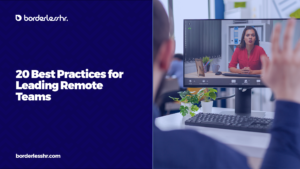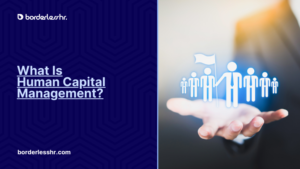Summary:
The future of human resources is being reshaped by the integration of artificial intelligence (AI) solutions. These AI-powered technologies are revolutionizing various HR processes, including recruitment, employee management, training, and decision-making. While Artificial intelligence brings immense benefits, it is crucial for HR professionals to address ethical considerations and mitigate biases. Regular audits and evaluations of AI algorithms are necessary to ensure fairness and transparency. Organizations must prioritize accountability and transparency, ensuring employees understand how their data is used and decisions are made. By embracing these trends responsibly, HR professionals can leverage AI to drive organizational success, create a positive work environment, and empower employees. Partnering with innovative HR solution providers, such as BorderlessHR, enables organizations to optimize their workforce and navigate the evolving business landscape. The future of HR lies in the effective integration of AI-powered solutions while maintaining a focus on ethical considerations and augmenting human capabilities.
In recent years, artificial intelligence (AI) has emerged as a game-changer across various industries, and human resources (HR) is no exception. AI-powered solutions are revolutionizing the HR landscape, enhancing efficiency, accuracy, and decision-making processes. From recruitment and employee management to training and performance evaluation, artificial intelligence is reshaping the future of HR in unprecedented ways. Let’s delve into the key trends that are shaping the future of human resources through AI-powered solutions.
Introduction to AI in HR.
Artificial intelligence (AI) is revolutionizing the field of human resources (HR) by streamlining processes and improving efficiency. With AI-powered solutions, HR professionals can automate tasks such as recruitment, employee engagement, performance management, and training. This introduction to AI in HR will provide an overview of the cutting-edge technologies and trends that are shaping the future of the industry. From chatbots and predictive analytics to virtual reality training, artificial intelligence is transforming the way HR professionals work and helping organizations optimize their workforce.
One of the most significant impacts of AI in HR is in the recruitment process. Traditionally, HR professionals spend a significant amount of time reviewing resumes, conducting interviews, and screening candidates. However, with AI-powered solutions, this process becomes faster and more accurate. Artificial intelligence algorithms can analyze resumes, job descriptions, and other relevant data to identify the best candidates for a position. This not only saves time but also reduces bias and improves the quality of hiring decisions.
Chatbots have also become a valuable tool in HR departments. These AI-powered virtual assistants can interact with employees and candidates, answering frequently asked questions, providing information about company policies and benefits, and even conducting initial screening interviews. Chatbots can handle multiple inquiries simultaneously, providing instant support and freeing up HR professionals to focus on more strategic tasks. Moreover, they can be available 24/7, ensuring that employees have access to HR assistance whenever they need it.
Predictive analytics is another powerful application of AI in HR. By analyzing vast amounts of employee data, such as performance metrics, attendance records, and engagement surveys, AI algorithms can identify patterns and trends. These insights enable HR professionals to make data-driven decisions regarding talent management, employee development, and succession planning. Predictive analytics can also help identify factors that contribute to employee turnover, allowing organizations to take proactive measures to retain top talent.
Employee engagement and performance management are areas where AI-powered solutions are making a significant impact. Continuous feedback systems powered by artificial intelligence allow managers and employees to provide real-time feedback on performance, recognize achievements, and address any performance gaps. AI algorithms can analyze this feedback and provide valuable insights on employee strengths and areas for improvement. By using AI to enhance performance management processes, organizations can foster a culture of continuous growth and development.
Training and development are crucial aspects of HR, and AI is transforming the way employees learn and acquire new skills. Virtual reality (VR) training programs, for example, provide immersive and interactive learning experiences. Employees can practice real-life scenarios, such as customer interactions or safety procedures, in a risk-free virtual environment. AI algorithms can analyze individual learning styles and preferences to personalize training programs, ensuring employees receive the most effective and relevant learning experiences.
Ethical considerations are essential when implementing AI in HR. HR professionals must ensure that AI systems are designed and trained to mitigate bias and promote fairness. Regular audits and evaluations of AI algorithms are necessary to identify and rectify any unintended biases. Organizations must also prioritize transparency and accountability, ensuring that employees understand how AI is used in HR processes and how decisions are made.
In conclusion, AI-powered solutions are transforming the HR landscape by automating tasks, providing valuable insights, and improving employee experiences. From recruitment to training and performance management, AI is revolutionizing the way HR professionals work and helping organizations optimize their workforce. As AI continues to advance, it is crucial for HR professionals to embrace these cutting-edge technologies while upholding ethical considerations to create a future where AI and human capabilities complement each other in driving organizational success.
Key AI trends that are shaping the future of human resources
As artificial intelligence (AI) continues to advance, it is revolutionizing the field of human resources (HR) and shaping its future. AI-powered solutions are driving significant transformations in recruitment, employee management, training, and decision-making processes. From intelligent candidate screening and data-driven decision making to personalized employee experiences and performance management, these key AI trends are reshaping HR practices, enhancing efficiency, and empowering organizations to thrive in an increasingly competitive business landscape.
1. Intelligent Recruitment and Candidate Screening
Finding the right talent has always been a challenge for HR professionals. However, with AI-powered solutions, the recruitment process is becoming more efficient and effective. AI algorithms can analyze resumes, social media profiles, and online portfolios to identify qualified candidates, saving HR teams significant time and effort. Moreover, AI-powered chatbots can engage with candidates, answer their queries, and even conduct initial screening interviews. These technologies not only streamline the recruitment process but also reduce bias and enhance diversity and inclusion efforts. One of the key areas where AI is making a significant impact in HR is in the recruitment and hiring process.
AI-powered tools have transformed the way organizations identify and attract top talent. These tools can analyze resumes, screen candidates, and even conduct initial interviews, saving HR professionals valuable time and resources. By leveraging algorithms and machine learning, AI-powered recruitment solutions can efficiently sift through a large pool of applicants and identify the most qualified candidates based on specific criteria set by the organization. This automation streamlines the hiring process, allowing HR teams to focus on more strategic activities, such as building relationships with candidates and conducting in-depth interviews.
Additionally, AI-powered recruitment tools have the potential to reduce bias and improve diversity in the hiring process. By removing human biases and relying on objective criteria, these tools help ensure a fair and unbiased evaluation of candidates, leading to a more inclusive and diverse workforce. As organizations continue to embrace AI in recruitment and hiring, the future of HR will witness increased efficiency, improved candidate experiences, and enhanced diversity and inclusion efforts.
2. Data-Driven Decision Making
AI-powered HR analytics tools have the capability to process massive volumes of employee data, unlocking valuable insights that drive data-driven decision-making. Through the analysis of patterns and trends, these tools enable HR professionals to identify the factors that influence employee turnover, engagement, and performance. By understanding these underlying factors, HR teams can proactively address potential issues and implement interventions to retain top talent.
Predictive analytics takes the power of HR analytics even further by forecasting future outcomes based on historical data. By leveraging AI algorithms, HR departments can accurately predict trends, patterns, and potential outcomes in areas such as employee retention, performance, and career development. These predictions empower HR professionals to make informed decisions and take preemptive actions to mitigate risks or seize opportunities.
With the help of AI, HR departments can optimize workforce planning and strategic initiatives. By analyzing data, HR professionals can identify skill gaps within the organization, enabling them to develop targeted training and development programs to address those gaps. Furthermore, AI-powered analytics can identify high-performing employees and potential leaders, facilitating succession planning and talent management strategies. This data-driven approach ensures that HR departments are equipped with the insights needed to align their workforce with the organization’s strategic goals, enhancing overall productivity and performance.
Overall, AI-powered HR analytics tools revolutionize decision-making in HR by providing actionable insights based on comprehensive data analysis. The ability to identify patterns, forecast outcomes, and make informed decisions allows HR professionals to optimize workforce planning, retain top talent, and drive strategic initiatives that positively impact the organization’s success.
3. Personalized Employee Experience
AI-powered HR solutions can offer personalized experiences to employees, boosting engagement and satisfaction. Chatbots and virtual assistants play a crucial role in this regard, as they can provide instant support and guidance on various HR-related inquiries. Whether employees need assistance with leave management, benefits enrollment, or policy information, chatbots can address their queries promptly and accurately, eliminating the need to wait for a response from HR professionals. These AI-powered assistants can also provide personalized recommendations and reminders tailored to each employee’s specific situation, ensuring that they stay informed and make well-informed decisions.
Furthermore, AI algorithms can customize training programs based on individual needs and learning styles. By analyzing employee data, such as performance records and skills assessments, AI systems can identify knowledge gaps and areas that require improvement. With this information, HR departments can design training modules that are targeted and relevant to each employee’s specific requirements. Whether it’s through interactive e-learning modules, virtual reality simulations, or microlearning platforms, AI ensures that employees receive the most effective and engaging training experiences, ultimately enhancing their knowledge and skillsets.
The ability to offer personalized experiences through AI-powered HR solutions goes beyond administrative tasks and training. It extends to fostering a culture of recognition and well-being within the organization. AI algorithms can analyze employee feedback, performance data, and even sentiment analysis of communication channels to understand individual preferences, needs, and challenges. Based on this analysis, AI systems can provide personalized recommendations for career development, growth opportunities, and well-being initiatives. For instance, AI can suggest tailored mentorship programs, wellness activities, or learning resources that align with an employee’s goals and interests. By leveraging AI to deliver a more personalized approach, HR departments can enhance employee productivity, job satisfaction, and overall well-being.
The integration of artificial intelligence into HR practices also allows HR professionals to shift their focus from administrative tasks to more strategic initiatives. With time-consuming and repetitive tasks automated through AI, HR teams can allocate their resources and expertise to more value-added activities such as talent management, succession planning, and organizational development. By leveraging AI-powered solutions, HR departments can streamline processes, increase operational efficiency, and devote more time and attention to activities that have a direct impact on the organization’s success.
In conclusion, AI-powered HR solutions provide organizations with the opportunity to deliver personalized experiences to employees, resulting in increased engagement, satisfaction, and productivity. Whether it’s through chatbots offering instant support, customized training programs, or tailored recommendations for growth and well-being, AI is transforming the way HR departments interact with employees. By harnessing the power of AI, HR professionals can optimize the employee experience, foster a culture of continuous learning, and drive organizational success in an increasingly competitive business landscape.
4. Performance Management and Feedback
Traditional annual performance reviews are being replaced by continuous performance management systems powered by artificial intelligence. This shift towards real-time feedback and performance tracking is revolutionizing the way organizations manage and evaluate employee performance. With AI-powered tools, managers and employees can monitor progress, identify areas for improvement, and address any performance gaps promptly. Gone are the days of waiting for a year-end evaluation to discuss performance issues or achievements. AI algorithms assess employee performance based on predefined criteria, eliminating subjective biases that can often influence traditional performance reviews. By relying on objective data, organizations can make fair and accurate performance assessments.
Moreover, AI-powered performance management systems offer valuable insights into skill development and career pathing. These systems can analyze employee performance data, identify skill gaps, and recommend targeted training and development opportunities. With personalized recommendations, employees can focus on enhancing their skills and aligning their goals with organizational objectives. Managers, armed with AI-driven insights, can guide employees towards growth opportunities and make informed decisions about promotions, career advancement, and succession planning. By leveraging AI in performance management, organizations can create a culture of continuous learning and improvement, resulting in enhanced overall performance and employee satisfaction.
5. Employee Well-being and Mental Health Support
Employee well-being and mental health have become critical concerns for organizations. The fast-paced, high-pressure work environment of today can take a toll on employees, leading to stress, burnout, and decreased productivity. However, AI-powered solutions are emerging as valuable tools in addressing these issues and promoting employee well-being.
Chatbots equipped with natural language processing capabilities can be deployed to monitor employee interactions and identify signs of distress or stress. By analyzing language patterns, sentiment, and keywords, these chatbots can recognize when an employee may be struggling or in need of support. They can engage in empathetic conversations, providing a safe and confidential space for employees to express their concerns.
Additionally, AI algorithms can analyze communication patterns and sentiment in employee interactions across various platforms, such as emails, chat messages, and collaboration tools. By detecting changes in communication patterns or detecting negative sentiment, AI can alert HR professionals to potential issues, allowing for timely intervention and support. This proactive approach enables organizations to identify employees who may be at risk of burnout or experiencing mental health challenges and offer appropriate resources and assistance.
AI-powered solutions can also provide employees with access to mental health resources and support. Chatbots can offer immediate information about mental health services, employee assistance programs, and self-help resources. They can provide guidance on stress management techniques, mindfulness exercises, and other strategies for promoting well-being. AI algorithms can recommend personalized well-being initiatives based on an individual’s needs and preferences, fostering a supportive work environment tailored to each employee’s well-being journey.
Moreover, artificial intelligence can facilitate the creation of a healthier work environment by identifying potential sources of stress or areas where improvements can be made. By analyzing data on employee engagement, productivity, and well-being, AI algorithms can provide insights into the factors that may contribute to stress or dissatisfaction. This information can guide HR professionals in implementing targeted initiatives to reduce workplace stress, improve work-life balance, and enhance overall well-being.
By leveraging AI to proactively address mental health concerns, organizations can create a work environment that prioritizes employee well-being and supports their mental health needs. This, in turn, can lead to increased job satisfaction, higher productivity, and reduced turnover rates. As organizations continue to recognize the importance of employee well-being, AI-powered solutions will play a significant role in ensuring the holistic health and happiness of the workforce.
6. Ethical Considerations and Bias Mitigation
While artificial intelligence brings immense benefits to HR, it is essential to address ethical considerations and mitigate bias in AI algorithms. HR professionals must ensure that AI systems do not perpetuate discrimination or bias in hiring, promotions, or performance evaluations. Regular audits and evaluations of AI algorithms are necessary to identify and rectify any unintended biases. Additionally, organizations need to prioritize transparency and accountability when using AI in HR processes, ensuring employees understand how their data is used and how decisions are made.
As Artificial intelligence continues to advance, the future of human resources holds tremendous potential for innovation and transformation. AI-powered solutions enable HR departments to streamline processes, make data-driven decisions, and enhance the employee experience. However, it is crucial to strike a balance between technology and human touch, as the human element remains essential in areas such as empathy, intuition, and strategic decision-making
Conclusion
In conclusion, AI-powered solutions are reshaping the future of human resources, providing unprecedented opportunities for HR professionals to enhance their practices and drive organizational success. By embracing the key trends in AI, HR departments can unlock the power of automation, data-driven decision-making, and personalized employee experiences. However, it is crucial to prioritize ethical considerations and mitigate biases to ensure fairness and transparency in AI algorithms. By striking the right balance between Artificial intelligence and human capabilities, HR professionals can harness the full potential of AI to create a positive work environment and empower employees for long-term success.
In this era of AI-driven HR, organizations can benefit greatly from partnering with a trusted and innovative HR solution provider like BorderlessHR. With BorderlessHR’s cutting-edge AI-powered platform, companies gain access to state-of-the-art tools and technologies that streamline HR processes, improve efficiency, and optimize workforce management. BorderlessHR prioritizes ethical considerations and ensures that its AI algorithms are designed to promote fairness and eliminate bias. Moreover, BorderlessHR emphasizes transparency and accountability, empowering organizations to maintain the trust of their employees throughout the AI-driven HR journey.
By embracing BorderlessHR’s AI-powered solutions, organizations can stay at the forefront of HR innovation, ensuring that they are equipped to navigate the rapidly evolving business landscape. With BorderlessHR, HR professionals can harness the power of AI to drive organizational success, create a positive work environment, and empower employees to thrive. The future of HR is here, and BorderlessHR is your trusted partner in unlocking its full potential.







